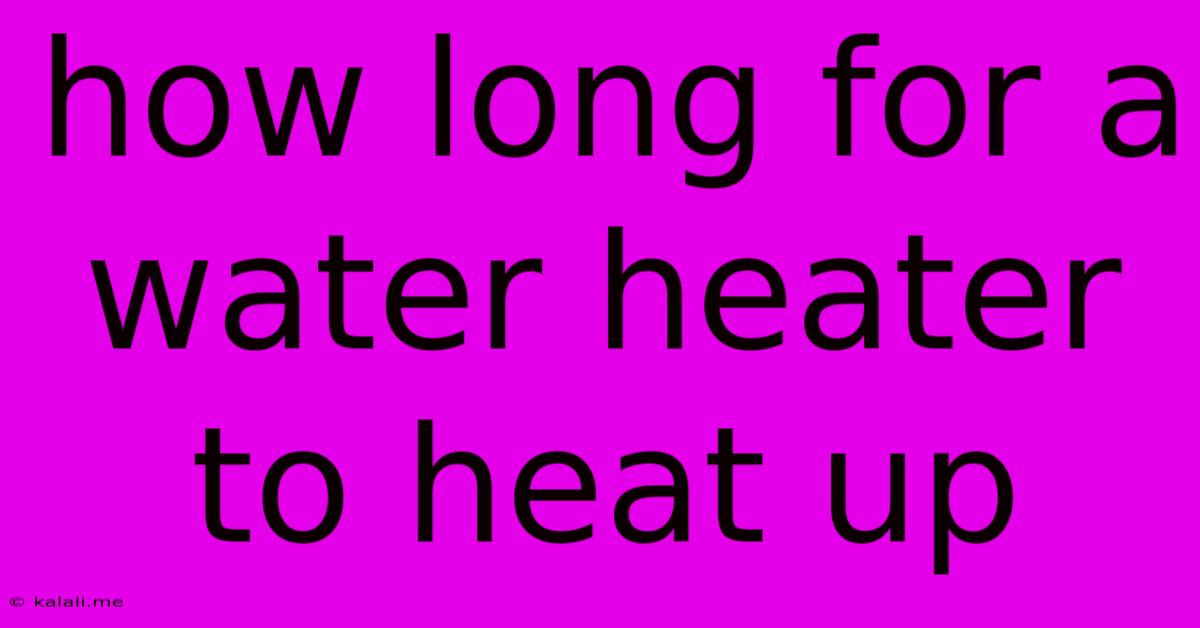How Long For A Water Heater To Heat Up
Kalali
May 31, 2025 · 4 min read

Table of Contents
How Long Does It Take a Water Heater to Heat Up? A Comprehensive Guide
Meta Description: Discover how long it takes your water heater to heat up, factors affecting heating time, and troubleshooting tips for slow heating. Learn how to optimize your water heater's efficiency and save energy.
Waiting for hot water can be frustrating, especially during peak hours. But how long should it take your water heater to heat up? The answer isn't a simple number, as several factors influence the heating time. This guide will break down everything you need to know about water heater heating times, helping you diagnose potential problems and optimize your hot water system.
Understanding Water Heater Types and Their Heating Times
The time it takes your water heater to heat up depends largely on its type and size:
-
Conventional Tank Water Heaters: These are the most common type. A typical 40-gallon tank can take anywhere from 2 to 4 hours to fully heat up from cold. Larger tanks will naturally take longer. The recovery time – the rate at which the heater replenishes hot water after use – is also crucial. A quick recovery time means shorter waits between showers.
-
Tankless Water Heaters (On-Demand Heaters): These heaters heat water instantly as it's needed, eliminating the wait time associated with tank heaters. However, they can struggle with providing hot water continuously for multiple users simultaneously. The heating time depends on the unit’s capacity and water flow rate, typically heating water in seconds to minutes.
-
Heat Pump Water Heaters: These energy-efficient heaters use a refrigerant to transfer heat from the surrounding air to the water, making them slower to heat compared to conventional heaters. Expect a heating time of 3 to 6 hours or even longer depending on the size and ambient temperature.
Factors Affecting Water Heater Heating Time
Several factors beyond the heater type influence how quickly your water heats:
- Water Heater Size: Larger tanks require more energy and time to heat up.
- Temperature Setting: A higher temperature setting will take longer to reach than a lower one.
- Water Usage: Frequent hot water usage will naturally reduce the available hot water and prolong the heating time until the tank is refilled and reheated.
- Water Inlet Temperature: Colder incoming water requires more energy and time to heat.
- Element Condition (Tank Heaters): A damaged or scaled heating element will significantly slow down the heating process. Mineral buildup reduces the element's efficiency.
- Insulation: Poor insulation allows heat to escape, prolonging heating times and wasting energy. Check for any cracks or damage to the insulation blanket.
- Thermostat Function: A malfunctioning thermostat might not be accurately regulating the temperature, leading to prolonged heating times or inconsistent hot water.
Troubleshooting Slow Heating Times
If your water heater is taking unusually long to heat up, consider these troubleshooting steps:
- Check the Thermostat: Ensure the thermostat is set to the desired temperature and is functioning correctly.
- Inspect the Heating Element (Tank Heaters): Look for mineral buildup or damage to the element. Descaling or replacing the element may be necessary.
- Examine the Insulation: Check for any cracks or damage to the insulation blanket. Repair or replace the insulation as needed.
- Assess Water Pressure: Low water pressure can affect heating efficiency. Contact a plumber if you suspect a pressure issue.
- Consider the Age of the Unit: Older water heaters may have reduced efficiency. A new unit might be a cost-effective solution in the long run.
Optimizing Your Water Heater for Efficiency
To minimize heating time and improve efficiency:
- Lower the Temperature Setting: Reducing the temperature by a few degrees can save energy without significantly compromising hot water.
- Insulate Your Pipes: Insulating hot water pipes reduces heat loss during transit, ensuring hotter water reaches the tap faster.
- Regular Maintenance: Schedule annual maintenance to check for issues and ensure optimal performance.
- Consider a Low-Flow Showerhead: These showerheads reduce water usage without sacrificing water pressure, helping conserve hot water.
By understanding the factors that influence your water heater's heating time, you can troubleshoot problems effectively and ensure a steady supply of hot water for your household. Remember that regular maintenance is key to prolonging your water heater’s lifespan and ensuring efficient operation.
Latest Posts
Latest Posts
-
How To Put Power Armor In Station Fallout 4
Jun 01, 2025
-
Minecraft How To Turn On Deaf Sounds
Jun 01, 2025
-
How Long Did It Take To Write The Bible
Jun 01, 2025
-
How To Find A Water Leak In Your House
Jun 01, 2025
-
Best Paint For Pressure Treated Lumber
Jun 01, 2025
Related Post
Thank you for visiting our website which covers about How Long For A Water Heater To Heat Up . We hope the information provided has been useful to you. Feel free to contact us if you have any questions or need further assistance. See you next time and don't miss to bookmark.